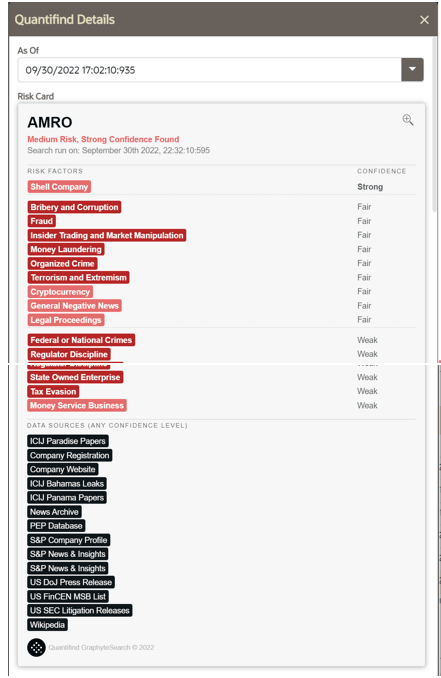20.24 Configuring Quantifind Batch Processing for Customer Score Card Processing
This section describes how to configure Quantifind Batch Processing for Customer Score Card Processing.
The Quantifind batch process submits customer entities to an ECM processing layer where they are then submitted in batch to Quantifind. ECM users do have the ability to request Quantifind risk cards in an ad-hoc manner through the ECM UI but the Quantifind batch process allows for bulk processing of customers which are extracted from the events created by the Behavior Detection Framework. This can provide great efficiency as cards are automatically available to the ECM users.
- Configure the KDD_INSTALL_PARAM table in the database using
Parameter Name and Parameter ID with the attributes provided
in the following table:
- Enter the Parameter Name as: ECMQuantifindService
- Enter the Parameter ID as: 3010
Note:
START_DATE and END_DATE attributes are not yet implemented. They are intended for the future use.Table 20-18 KDD_INSTALL_PARAM Table
Column Name Attribute Code Attribute Description OOB Value ATTR_1_CD PROXY_REQUIRED This attribute specifies whether a proxy is required to call the Quantifind batch API. Y ATTR_2_CD QUANTIFIND_URL This attribute specifies the Quantifind URL ##QUANTIFIND_API_URL## ATTR_3_CD
QUANTIFIND_API_HEADER_PARAMS This attribute specifies the header params required by the Quantifind Batch API. It should be provided in format For Example: {"Content-Type":"text/plain","x-qf-app-name":"sandbox","x-qf-app-token":"ceidaelah0Ahdeiteeyio6sooph0Eighuhuemie8faiZ6zah2d","User-Agent":"PostmanRuntime/7.26.10"} ##QUANTIFIND_API_HEADER_PARAMS## ATTR_4_CD STATUS_CHECK_INTERVAL This attribute specifies the interval at which Quantifind status check API should be called. The value mentioned is in seconds. 60 ATTR_5_CD SUBMIT_BATCH_SIZE This attribute specifies the maximum number of requests which will be sent to Quantifind Submit API in one batch. 5000 ATTR_6_CD RESULT_FETCH_SIZE This attribute specifies maximum number of results received in one batch. 1000 ATTR_7_CD START_DATE This attribute. Is not yet supported NULL ATTR_8_CD END_DATE This attribute Is not yet supported NULL ATTR_9_CD AGING_PERIOD This attribute specifies the total number of days, Quantifind card is valid. Till it is valid, New request for the same customer will not be sent to Quantifind 30 ATTR_10_CD ALLOWED_ENTITY_TYPES This attribute specifies the allowed entity types for obtaining Quantifind information. Only customer is supported. CUSTOMER - Configure the business domain and jurisdiction in the
FCC_EXTRNL_RQST_EVNT_FLTR table. Customer entities will be
picked up by Quantifind batch for processing based on this
configuration. Currently the entity type can only be
CUSTOMER. A sample entry for the filter table is shown
below.
Table 20-19 FCC_EXTRNL_RQST_EVNT_FLTR Table
V_FILTER V_COLUMN_NAME V_FILTER_VALUE JURISDICTION FCC_EVENTS.V_JURISDICTION_CD 'AMEA', 'EMEA' BUSINESS_DOMAIN FCC_EVENTS.V_BUSINESS_DOMAIN_CD 'a','b','c','d','ab','ac','ad','bc','bd','abc','bcd','abcd' ENTITY_TYPE FCC_EVENT_ENTITY_MAP.V_ENTITY_TYPE 'CUSTOMER' - To ensure the correct proxy is used when the Quantifind API is
called, update the PMF proxy settings in the
AAI_WF_GLOBAL_SETTINGS table in the Config Schema. The
following values should be updated.
- PROXY_SERVER_IP: <<PROXY_SERVER_IP>>
- PROXY_SERVER_PORT:
<<PROXY_SERVER_PORT>>
Insert into AAI_WF_GLOBAL_SETTINGS (V_PARAM_NAME,V_PARAM_VALUE) values ('PROXY_SERVER_IP',<<PROXY_SERVER_IP>>) / Insert into AAI_WF_GLOBAL_SETTINGS (V_PARAM_NAME,V_PARAM_VALUE) values ('PROXY_SERVER_PORT',<<PROXY_SERVER_PORT>>)
- Run QUANTIFIND_FORM_ENTRIES_OPT.sql in the Config Schema.
- To allow ECM users to view and/or request Quantifind risk cards
from the Customer tab within the ECM application, the
following functions must be assigned. These functions must
be associated with the corresponding user roles as
necessary.
- View Quantifind Information: This allows the users to view Quantifind risk cards received from Quantifind.
- Get Latest Quantifind Information: This allows user to request a Quantifind risk card for the selected customer by automatically calling the Quantifind API.
- Restart the servers and clear the browser cache.
- Login to the application with Administrator credentials.
- Add the connector (Oracle Behavior Detection to CA External Request HS) before Entity Surrogate Key Generation for BD in ECM batch.
- Execute the ECM batch. The fcc_extrnl_request_hs table will be populated with BATCH_RUN_ID and N_RUN_SKEY.
- Navigate to Run screen in the Rule Run Framework.
- Select the Additional_Entity_Information and click Fire Run.
- In the pop-up window, enter the MIS Date and click
OK to start the Quantifind batch.
Note:
The ECM batch must be completed before running the Quantifind batch. - The running batch can be monitored via Batch Monitor from the
Admin UI. Once the batch is completed, the details are
stored in the following tables.
- FCC_EXTERNAL_REQUEST_AUDIT
- FCC_EXTERNAL_RESULT
Note:
Error with data during the batch process are only found in the error logs and will not be reprocessed by the batch (unless that customer shows up again the next day with the data corrected). The user can use the ad-hoc process if the risk card is missing.
- Login to the application with Supervisor credentials.
- Search the Case.
- Click the Customer Tab to view the list of customer
details.
Figure 20-37 Customer Tab

- Click the required Quantifind Card Details to view the
Quantifind Details with the current score and
the request time.
Figure 20-38 Quantifind Details
